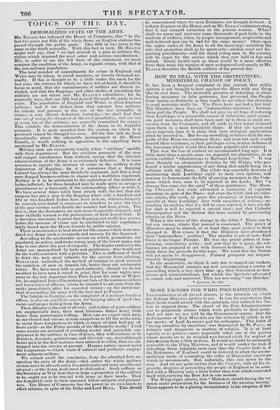HOW TO DEAL WITH THE OBSTRUCTIVES ; MINISTERIAL CHANGE OF
POLICY.
Ir has been a frequent complaint in this journal, that public opinion is not brought to bear against the Peers with any thing like its real force. The miserable practice of defending or aban- doning measures on false pretences, has prevented the People from seeing as distinctly as they ought to see where the obstacles to good measures really lie. The Peers have not had a fair trial The Ministers have been an "intermediate substance" betweer them and the People. We shall not give up all hope of reducing their Lordships to a reasonable course of behaviour, until numer ous good measures shall have been sent up to them in rapid sue cession from the Commons, and all such as they reject returned upon them in a more formidable shape. If they are again and again rejected, then it is plain that very stringent applications must be resorted to. But we are unwilling to believe that the ma- jority of the Peers are confirmed idiots; and none but such would hazard their existence, or their privileges even, in open defiance of the warnings which would then become palpable and constant.
This was the line of conduct we recommended long ago. It is little more than a month since we repeated our admonition, in an article entitled "Obstructions to Rational Legislation:** It was then thought an abominable doctrine by the Whigs, who pro- fessed a tender apprehension of any thing that might bring on a collision with the Peers. The Globe was especially desirous of maintaining their Lordships' right to their own opinion, and anxious to demonstrate the folly of passing measures in the Com- mons which were sure to be rejected in the Lords. But "a change has come o'er the spirit " of these gentlemen. The Morn- ing Chronicle last week advocated a succession of vigorous measures in spite of the Peers; and even the Globe had an elabo- rate article, this week, to prove the advantage of knocking fre- quently at their Lordships' door with measures of reform,—re- minding its readers, that if a bill be once rejected, it does not fol- low that it will be rejected a second time; and that Catholic Emancipation and the Reform Act were carried by persevering attacks on the Peers.
What is the cause of this change in the Globe? There can be but one reason, where that journal is concerned. The policy of Ministers must be altered, or at least they must profess to have changed it. How comes it that the Ministers have abandoned their "intermediate" position? The murder is out at last—Earl GREY is no longer Premier. He was the grand patron of tem- porizing, conciliatory policy ; and now that he is gone, his col- leagues are prepared to act with discreet boldness. At least we think there are grounds for this hope. We trust that the Nation will not again be disappointed. Present prospects are unques tionably brightening.
In the meanwhile, we think it only fair to remind our readers, that the Ministerial journals are now recommending a course of proceeding which, a very short time ago, they denounced as dan- gerous and unconstitutional, but which the Spectator advocated as sound, safe, and necessary. They are now using " our thunder."
• Spectator, No.311.




















 Previous page
Previous page